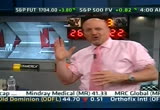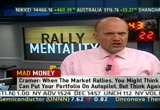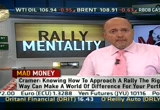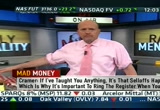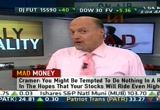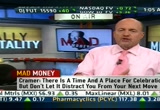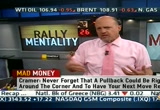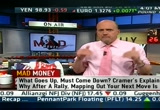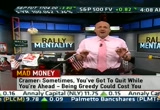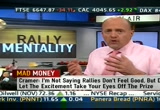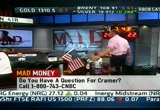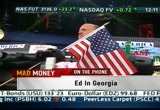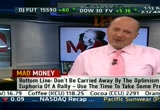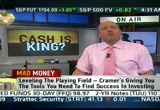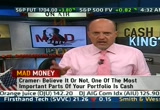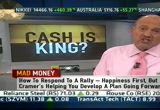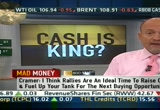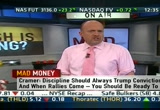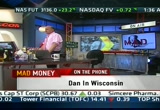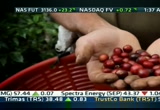tv Worldwide Exchange CNBC August 3, 2013 4:00am-5:01am EDT
4:00 am
my mission is simple, to make you money. i'm here to level the playing field for all investors. there's always a bull market somewhere, and i promise to help you find it. "mad money" starts now. hey, i'm cramer. welcome to "mad money." welcome to cramerica. other people want to make friends. i'm just trying to make you a little money. my job is not just to entertain you but to educate you. call me, 1-800-743-cnbc. late to the party? terrible feeling. there's nothing worse than watching those dow jones averages roar higher while your portfolio sits there barely moving. makes you feel like a complete dope, doesn't it?
4:01 am
like the stock market must be some sort of total shell game. but really, it just means you might be making a few basic mistakes. that's why tonight i'm devoting the whole show to my playbook for taking advantage of a short-term rally. by the way, not to be confused with a so-called bear market rally. bear market rally, bull market rally. come on, these are meaningless. a bear market rally's just a bogus term people throw around whenever stocks go up when the intelligentsia thinks they should be going down. i'm trying to give you a game plan to deal with short-term moves as opposed to long-term run-ups in your stocks. i know what a lot of you are thinking, what kind of bozo incompetent doofus needs a guide to making money in a ally? what's next, is cramer going to draw us a diagram explaining how to walk and chew gum at the same time? "mad potty training"? who needs help when the dow is up 200 points in a day? who needs help even better during a multiday run, a real buyfest? do you really need my advice to help you deal with what huge profits you might have?
4:02 am
do we maybe in cramerica buy into stock sage biggie smalls' theory of mo money mo problems? absolutely not. but knowing how to approach a rally the right way can definitely make you a better investor. you have to have a game plan for rallies. and for those of you who've had your portfolios trashed so many times in the last two decades making sure that doesn't happen again, rebuilding your wealth on a sound basis, that's as important as it gets. sure, everybody makes money who is long, who owns stocks, in a big rally. right? i mean, it can feel like your portfolio's running itself. you don't have to pay any attention to it. but i'm not here tonight to talk about how to make the most possible money when the market is up big. honestly, i could care less. the most important lesson for dealing with a major short-term move higher is that you always have to work hard to prepare yourself for the future. and not let some great opportunities to sell, particularly some of the not as great stocks, pass up. you can't pass up on that opportunity.
4:03 am
that's right. just as we can't give in to despair when the market's down big, and i know a lot of you were tempted to do that, you certainty don't want to give into euphoria and -- buy, buy, buy! when the market is roaring, giving you a great chance actually not to buy but to do some selling of inferior merchandise or stocks that have run up too quickly. you don't actually have a profit, remember, until you sell something. you aren't making money until you hear this sound. [ cash register ] and the idea that you buy and hold through the best and worst of times, that simply is not borne out. it's just not true. no matter how many times you've read it or been indoctrinated by professors, people who come on air, they all seem to know this stuff. no, they don't. you see, when you get a rally like, this a short-term rally, you need to use that strength to do some lightening up. sell, sell, sell! >> particularly on stocks that
4:04 am
don't pay good dividends or ones where the fundamentals are deteriorating. and you got lucky because a rising tide lifted all boats. which is why i always insist on people doing their homework and not just forgetting about the portfolios. oh, boy, another bogus concept promoted by doctrine-area gray beards many of whom i like personally but i know they simply haven't done the work that i have and haven't invested successfully i may say for 33 years. let me put it this way. nobody, nobody, nobody wants to miss a rally. if you sold every stock you opened right before a huge up day you'd feel like an idiot. a stooge even. not even larry, curly, or moe, but the dreaded shemp! you'd be kicking yourself for months. me? i don't kick myself till the day i die! but look at it this way. you're in stocks through the rally and you have massive gains but you don't do anything, you let them ride. you think you're real smart. then gradually or maybe not so gradually your stocks come back down, they retrace. perhaps back to the price before the rally. maybe even lower. if you hang on for too long, if
4:05 am
you let your gains ride until they evaporate, you may as well have missed the rally entirely in the situation i just traced out. you will have made nothing and you've held on to a whole bunch of stocks not deserving of your ownership. making lots of money on a great day or great month or great year is wonderful. it's why many of you are in the game. but can't view a rally as just a day or a few days where your portfolio went up in value and then nothing more, so what. no, you can't say so what. you have to see it as a time to take action. even if you don't fancy yourself a trader and try on the time the market or make many trades. if you're like that, you have to make an exception for these really rip-snorting days that are almost unnatural, up 180 day. that's somewhat unnatural, people. i tell you what, don't misunderstand me. a big up day is something that should be somewhat celebrated. i always like to temper that. you know that. and it should be remembered next time. why? because you've got to save it up for when we get hit with a nasty downturn and you want to sell everything. you have to remember no, no, no, there's going to be another 180-day up day ahead. i remember what i felt when that happened.
4:06 am
that will keep you in the game. but just as you need to remember the good days during a sell-off you also have to remember there will always be more sell-offs in the future when the market is roaring, as was the case -- look at this. remember the market was roaring for months and months and months, from the beginning of 2013 until ben bernanke indicated he might no longer have our backs through the lowest interest rates imaginable? that's why i say sell the rips but buy the dips. don't pass up an opportunity to lighten up just because you're in stocks for the long run or because you have heard it's wrong to trade stocks and you're an investor. just literally 100 shares. sell 25. being an investor does not absolve you of the need to have judgment for heaven's sake. in other words, you have to approach every rally with a grain of pessimism about what can happen next. that shouldn't be hard after the way the european crisis seemed to crush us over and over again, 2011, 2012. every time we were up they pulled us back down. you'd have weeks where the dow would rally 200 points one day off a positive statement from a european official you never heard of only to get crushed the next day by some other official
4:07 am
to saying in negative. that kind of volatile reaction is a classic example of why it makes sense to use a major rally to take some profits -- i'm not saying sell it all. some profits. because you never know how long those profits will last. there's nothing wrong with feeling good about a rally. as someone with violent mood swings and a habit of reaching for the cheap scotch so i can head to the dirty linoleum floor that i love so much on a bad friday when we get a really terrible market, i recognize the value of being able to celebrate your stocks in the same way that i respect the fear and loathing that i undergo when i'm drinking that johnnie walker red. euphoria is fine as long as it doesn't lead to complacency. and that's what i'm concerned about here. complacency is the enemy of every investor. on a big up day you can be thrilled. just don't forget you have a terrific opportunity to sell stocks at terrific prices that maybe they don't deserve those great prices. that's what short-term rallies are for. but we can get swept away by the positivity. i know because i've been there myself, and not just because of the spice girls concert at the rock in newark that my daughter forced me to attend to. when the market's up and
4:08 am
everybody's optimistic, the last thing people want to do is sell. once you believe in the market again, when everything seems wonderful, how could you ever want to sell a stock? it's one of the many situations where your emotions are going to get in the way of making the right decision. the exuberance is enough to make you forget the most basic maxim in all of investing, oh, something -- something really that just distinguishes me as really old. i believe in buying low and selling high. so you end up sitting back and watching your stocks go higher without a care in the world. but you know what? nobody ever made a dime being carefree. the trouble with being complacent during a rally is it encourages you to do exactly the opposite of what you should be doing. i know the feeling. you're sitting there, you're watching the gains, you're watching the tape underneath me, right? oh, wow, that's mine. oh, yeah, oh, wow. and you feel like selling some stock would be the most insane thing in the world. because what happens if the rally does keep going? doesn't matter. got to sell something into the strength of the merchandise we don't like. we also never sell all at once. that way timing isn't that much of an issue. take some off.
4:09 am
if the rally holds up, you can sell more later. the name of the game is preparation. now, there's no real way to prepare for a rally other than by owning stocks. but during a rally you can prepare yourself for the bad days and the really bad days that could be coming. the best time to adjust your portfolio so you're ready for the next sell-off is when stocks are going higher. and that's why you have to approach a rally with caution, not unbridled enthusiasm. when the dow's up 200 points in a day, i don't think wow, this market is great, time to do a buy, try to really get some stocks. that's not sensible. that's not -- there's no common sense to that. after i calm myself down after a huge run, maybe bite the heads off some little bear toys, i think about what i'm going to need if the market now goes south after that big run. and i also consider what you can do for your portfolio today, the day of the rally you that couldn't do yesterday. the answer to both questions involves selling. but i don't mean selling everything. that would be nuts in all but the most dire situations. you know on this show we believe in buying and selling stocks incrementally.
4:10 am
that's something i teach you in -- remember "real money: sane investing in an insane world"? still in print after so many years. this is my show. i can shamelessly self-promote. during a rally you want to sell in bigger increments to get those great prices while they last because they may not. now, in the rest of the show i'm going to go through the whole "mad money" rally playbook, all new for a nutty time, explain what to sell, how to sell, and why you're selling it. but right now the bottom line is when the stock market has had a big short-term run, just a big short-term run, lickety-split, don't get carried away by the optimism. instead keep your head on, keep it straight. focus on the long term. think about register ringing on the goods that don't deserve to be owned that got marked up by a market that got widely enthused and lifted everything including stocks that would otherwise not be worth your time or certainly your money. let's go to walter in my home state of new jersey. walter. >> caller: how are you doing, jim? walter here in new jersey. i had a question for you. what i do in a bull raging
4:11 am
market, i sell calls on -- call options on all my stocks. and then if it pulls back i sell the puts the same month, different strike price but the same expiration date. that's what i've been doing. what do you think? >> walter, whatever works for you is fine. but i will tell you i don't like that strategy. i'll tell you why. first you cap your up side. i like stocks, and i don't want to have to think, oh, boy, it's going to get called away by that short call. second, when you short a put that is a limited amount of gain but unlimited down side. i never like to set up a situation where my gain is limited, but my downside is unlimited. let's go to ed in georgia, please. ed. >> caller: hey, jim. thank you for taking my call. appreciate all the education that you provide us smaller investors. and of course part of education is doing homework. >> yes. >> caller: doing my homework, i revisited your book "real money." and in that book you have a sector investing chart. it's key to gdp swing. of course nowadays we're sort of in a smaller growth range or lower growth range.
4:12 am
so my question is should we be looking at selling and buying the same sectors on these smaller swings we have today, or has the game changed and maybe the smaller differences in gdp growth might dictate different sector investments than the past? >> you know the game has changed. i think that much of "real money: sane investing in an insane world" holds up under close scrutiny. but that particular chart and that moment about what to do where, for instance, i say never buy an airline, well, the airlines have changed industry. they only have a couple competitors. so i like that. and we don't get the volatility like we used to because we don't seem to get the whole equality growing. so the chart unfortunately is not working right now. everyone loves a rally, right? but you can't get carried away. that's the theme of tonight's show. we need you to take some profits. hey, mo money, mo problems? it's only a problem if you don't ring the register. "mad money" will be right back. >> announcer: don't miss a second of "mad money."
4:13 am
4:16 am
in all my 32-plus years in this business i can't recall a single time where someone's come up to me and asked, hey, jim, the mortgage rally went crazy, what the heck do i do? that's unfortunate that i don't get that knock because just as you need a playbook to deal with declines, something i give you on "mad money" as well as "getting back to even," that's the guide to coping with troubled and volatile markets, you also need a rally playbook, a guide that tells you what to do when the market's having a big short-term run. cramer hasn't finally gone over the deep end, although speaking of myself in the third person definitely isn't a sign of sanity, but i've been doing that for years. look, i know the received wisdom is that nobody wants help with a rally. but you need to reject the idea that people only need help when the market is lousy. there are all kinds of mistakes you can make when the market is going higher.
4:17 am
in fact, the rally playbook may be more important than the sell-off playbook if only because fewer people think they need one and fewer still know what to do. i'm sharing my accumulated wisdom as a well-preserved 68-year-old man. i get to call it wisdom instead of stuff learned. always be really tough on your portfolio on by up days. the only time you should be harder on the stocks you own is when we're in the midst of a brutal sell-off, no end in sight and you need to circle the wagons. meaning dump everything you aren't thrilled to own and use the cash to shore up your positions in the stocks where you must have the most conviction. how exactly do you get tough on your portfolio? do you beat it up for lunch money? waterboard it until it talks? i thought i was on "homeland" for a second or maybe early "24." how about give it the silent treatment? how about a time out? i'm not rule out those options. but what i mean by getting tough su want to give every one of your stocks the harshest possible evaluation. suspend the benefit of the doubt. assume everything you own is guilty until proven innocent. focus on the worst qualities of your stocks. emphasize the down side.
4:18 am
make each and every company you own prove to you that it's worth holding all over again, which if you sold it would you buy it back? if this strikes you as silly or even unfair to your fabulous stocks, let me explain. on a good day or a good week you're ready to fall in love with your positions because they've made you so much money although remember we never countenance emotions like love with stocks because in the end they are merely pieces of paper. you love your spouse. you love your kids. you can love your cat. you can love your dog. go ahead, love your car, love your house, love your gun collection. just as long as you don't become enamored with a silly piece of paper you bought for the sole purpose of making money. now, especially in a rally you shouldn't give your stocks too much credit for making money unless they dramatically outperform the rest of the market. yet even then you should give them a hard time. when a stock makes you a lot of money the normal reaction is for you to like the stock more. i get that. however, most of the time you should really like it less. for the simple reason that as stocks go up they do become more expensive. during a major marketwide rally
4:19 am
unless there's some serious good news that bolsters the case for some of your individual stocks, they all become pricier and therefore i think less desirable. with the exception of any lagers that got left behind by the rally. i'm going to talk about those later. remember, buy low, sell high, quaint as it sounds, still rules in cramerica. in other words, in the wake of a big upmove, your entire portfolio just got less attractive. like i explained to subscribers of actionalertsplus.com the online subscription service that tells you what i'm going to do with my charitable trust before i do it, price matters. when a stock price goes up the risk-reward becomes worse. that's why the higher a stock goes that i own for action alerts the more likely i'm going to rerate it lower when we do our weekend bullet ins because it's getting more risky not less. as it goes higher and i care foremost about risk when i am investing sure you made money, which is what we're after, but you can't let that prejudice you in favor of any particular stock. just like blackjack the cards have no memory.
4:20 am
your stock may have gone up while the market was rallying today or yesterday. that doesn't have much bearing on where it goes tomorrow. that's the first reason to get tough on your stocks, just became more expensive from the rally and less compelling investments thanks to the move. the risk-reward has deteriorated and maybe in a meaningful way. let me explain this. let's say you bought texas instruments at, say, $30 and you thought it could go up $9 or down $3. your potential up side was three times the size of your potential down side. fabulous risk-reward, right? but then suppose during the rally texas rocketing up four points on no news. that could change everything in your mind, everything. after that run texas instruments could go five or down seven, which means you know own a stock where the down side outweighs the up side. so what if the stock's been a good performer? that's awful risk-reward. and you'll want to sell. >> sell sell sell! >> end of story. as much as we may know and like the company. and know it hasn't changed that much in value the stock is simply not the same stock up seven points than it was before. same company, not the say stock. more expensive and not as safe. if there's too much enthusiasm
4:21 am
all at once, text instruments can be downright dangerous. same company, different stock. hey, good company, expensive stock. second reason to get tough on your stocks during a rally is so you can figure out which ones to sell and sell hard. i tell you to sell into strength all the time but i recognize this idea is totally emotionally counterintuitive. can i even use that word to apply to feelings? yeah, it's my show. anyway, in a rally everyone else is buying things like crazy, right? you feel great about your stocks. even euphoric. and you certainly don't want to sell. but you have to. you have to sell something. because there's no better time to sell than during a major short-term move higher. and by the way, the selling doctrine applies to everything. mutual funds. gigantic short-term runs. it's okay to ring the register, even on the sainted mutual funds. i know it's radical. i know it's heresy. but the facts have been borne out by years and years and years of underperformance for almost all stocks except those that pay huge dividends. we have had to rethink time-honored concepts. i know i have. i have had to risk the
4:22 am
opprobrium of an investing establishment that refuses to look at the facts that are important to them. they refuse to do nothing but hold them all the time and don't take some short-term action to book profits in some of your portfolio. they act as if they are never wrong, but they have acted that way through years and years of actually being wrong, and i seem to be the only one that ever calls them out on this so they're probably just going to continue to say it. when there's no risk to them saying it other than cramerica. i don't know why that is. i don't care why that is. i've got to do what's right for you, not what's right for them. so how do you fight your instincts? how do you get to a place where you can sell in spite of your emotions? it's simple. just like i said before, you get tough on that portfolio of yours, reevaluate your stocks and demand a lot more from them than you normally would before a rally. especially since they're more expensive than they were a couple days before. i have a very specific way of grading that is very clinical and it's what i used at my hedge fund. at the end of every week i constantly rank the stocks. that's what i do in my charitable trust now.
4:23 am
scaled from 1 to 4. the 1s, listen up, this is important. 1s are -- it's all important. but 1s are stocks you would buy at their current price. monday morning. 2s are stocks you'd buy if they pulled back. 3s are stocks you would sell at a higher price. and 4s you sell monday morning. period. when it comes to this ranking system a rally has a way of simplifying things. prices are up so some of the old ones stocks worth buying at the current price, they become 2s. stocks worth buying only on a pullback, since most things will be too expensive to pull the trigger on. better keep your powder dry and wait for a sell-off down the road before you do any buying. meanwhile, a lot of your 3s, those were the stocks you wanted to sell into strength, they can now become 4s. stocks you can sell right now. because you got the strength you were looking for to sell. this is just a preliminary approach to what you should sell in a short-term rally. i'm going to give you more detail later in the show. the reason we rank our stocks like this is to keep our emotions in check so we buy low and sell high instead of just buying high because it feels so good when you're doing it.
4:24 am
sure doesn't feel good a couple days later. most people for reasons we don't have time to go into right now like buying stocks but see selling them as a defeat. it's not a defeat when you're getting top dollar prices during a juicy rally but first you have to put yourself in sell mode and you start by getting tough on those stocks. remember that. tough on those stocks. bottom line. during a big up day and after don't get swept away by the euphoria, please. don't listen to the doctrine that it's not worth it to actually book a profit on some merchandise because it isn't the same merchandise up higher than it was before. if the fundamentals aren't changed, if it hasn't improved as a company, then it might have gotten too expensive in that short-term rally. so give your stocks a hard time. hold them to a higher standard. and ring the darn register on the names you like the least and the ones that are up the most. patrick in arizona. patrick. >> caller: hi, jim. >> hi, patrick. >> caller: i own some stock from a company that i retired from, and it's up about 100%. but i struggle every day to try
4:25 am
to get myself to be able to take some profits out of it. keeping the emotions out of the stock market is getting difficult. and this holds true for stocks that you need to buy of the companies that have products you that don't like. >> okay. >> caller: that are good stock. is there any techniques or anything you use to set aside -- >> yeah, i'm going to give you a technique and it's really a very simple one. sell a quarter of the position. if you really feel like you can't live with it, you can buy it back. you'd be amazed once you sell that quarter position. below me, you're going to actually feel relief. i know that seems counterintuitive but i've been at this thing for a long time. i bet you you don't buy it back. i bet you just say you know what? i feel better. i've booked a big profit. keep your standards high and be able to keep your head higher. you'll ring the register on names that you like the least or the ones that just have had a huge run in a very short period of time that's not justified by
4:26 am
the fundamentals. after the break i'll try to make you even more money. >> jim cramer, you're one of my heroes. >> i look forward to your show every weeknight. >> thank you so much for helping beginning investors like me. >> when you talk about the market, i just believe that you're spot on. >> oh, i love it. thank you so much. every night we watch you i have learned and earned.
4:29 am
people don't like to hear about selling stocks. except when they're panicked and think the entire world is falling apart. then they want to be given permission from me to sell everything. even when that's almost always a mistake. generally, most want to know about buying, especially what to buy as you can see if you follow me on twitter @jimcramer after a rally. ultimately you should have a plan for selling after a rally. every single stock you own you should have a plan for selling if it just gets to a certain level. simply as part of the process of being a good investor. because stocks in good companies can get very expensive as we saw in the huge runs before collapses say in chipotle or blackberry, deckers. this year. or intel. hewlett-packard. they were all good companies. but the stocks went nuts. we don't like to own stocks that are nuts.
4:30 am
these are companies that their stocks went too darn high. let me make this clear. selling into a rally is not solely about turning a profit it then and there. obviously, we're looking to buy low and sell high. so a big up day or two gives you a great chance to do some selling. but the best reason to take some profits or cut your losses, what i talked about at the beginning of the show, comes down to preparation! what am i talking about? look, i believe you should be prepared for the bad days down the road because look, maybe i'm a glass half empty kind of guy except when i'm a glass half full kind of guy. but mostly because the bad days are just as inevitable as the good ones. listen, fact of life. and what's the best time to get ready for these inevitable down days? how about during or right after a big up day? think about all the times where a market has roared off some ethereal talk about a potential solution, say, to the woes in europe, only to come crashing back down when some german official puts the kibosh on anything that would actually help or a french potentate talks
4:31 am
about the need to confiscate money from the rich at just the wrong time. although some would question if there's ever a right time for that action. imagine how much better you'd done if you'd used that initial rally as a selling opportunity, take something off the table, raise some cash, and then cycle right back into -- >> buy buy buy! >> in other words, ai short-term rally can be your best opportunity and best friend to protect yourself from the potential down side. trust me, you get the most mileage out of preparing for the worst days on the best days. don't get me wrong, though, that doesn't mean you should sell anything into any kind of strength. that's never been my way. it would be self-defeating. it doesn't mean you should believe all rallies are ephemeral and not to be trusted. many rallies have staying power or else we'd still be at dow 1100, where i started. and you can take it higher and higher, true jackie wilson style, late great one's great big gig, reminiscent of his manager. you can take some. you can believe in a rally and still use a big up day to take some profits and get ready for a future that likely won't be as good. there's no cognitive dissonance
4:32 am
here. we're just trying to balance the concepts of capital preservation. that's the need to keep your money secure. with capital appreciation. that's the need to grow your money. both of these are pure necessities. and by the way, despite what you may hear, they're not mutually exclusive. use a rally to take profits so when the market comes back down you'll have the cash on the sidelines ready to put to work buying stocks that are put on sale of the company that may have been exactly the same the whole way and the stock went up 10% and went down 10%. so the rally is an extension, more of a prologue to the sell-off playbook we talk about in the show. we use it to stockpile everything we'll need in cash just in case things get bad. you know what? in those situations cash is what you have to have. now, i'm not a capitalist at heart. i'm a monarchist. as long as cash gets to be king. plain old cash is probably the single most important part of your portfolio. i cannot understate the value of it. most of the home gamers i talked to don't know this. i hear from people all the time who tell me they're fully
4:33 am
invested meaning every dime of their money earmarked for stocks is invested in stocks. whenever someone tells me this they think it's a good thing. i'm fully invested. cash, my friends is what makes everything else possible. back at my hedge fund i would never have less than 5% of my portfolio in cash. it was -- i was always scaling out of winners. keeping core positions in my investments on the sheets to trade around or lighten up as they spurted higher. i loved having cash after a big day or would on the upside and i never liked having a huge day where i trounced the average because that would mean i would be trounced if the market switched directions and started going down. i always used huge up days to do what i call raising ammo for the down days. i always raised ammo and what gave me the flexibility to outperform the market so much was the ammo! cash's flexibility. when the market gives you an opening to start a position in a stock or maybe buy more of something you already own, you need to have some cash on the sidelines in order to do that buying. otherwise you're going to have to sell something you already own and you may like. you're going to have to sell it on the fly or use margin.
4:34 am
now, meaning you borrow money from your broker. and that is something i've never recommended. never. it's too risky. speaking of margin a big rally gives you the best opportunity to get off the margin, start investing like a sane man rather than someone with a financial death wish. we hate margin on "mad money." we would outlaw it in cramerica if we could. we save borrowed money for buying a house we can live in. we can't live in stocks. you can't. so we don't take out a mortgage or home equity loan or any other kind of debt to buy them. what's this got to do with responding to a rally? while we'd all like to be heavily invested with a little cash before the rally i've got to tell you it's too difficult. but the best time to raise cash which many of you absolutely must do if you're fully invested and the rest of you should want to do or do is right after a many days of a rally. think about it like this. your portfolio's cash position is like your car's gas tank. if you don't have 5-5% cash you're running on empty and you'd better fill her up the next chance you get. whatever you sell to raise cash and we'll talk about that after the break you'll get a much better deal after multiple rally
4:35 am
days than before. simple, right? but listen, i'm not just saying that rallies are a great time to go into all cash. not at all. i'm saying i believe it's essential to raise some cash during or after a rally. i don't care how much you like your stocks. not selling something to raise cash when the market's making it easy for you is downright reckless. for actionalertsplus.com, my charitable trust and all stock fund i use to pay for charity i've take-minute cash position up to 20% when i've sensed there was too much euphoria. and you will know euphoria when you see it. like the 19 straight up tuesday that's distinguished the first part of 2013 as usda certified euphoric. i put that swing cash back into the market on the way down in stocks that i liked a lot more than the ones i would have otherwise hung on to. even so the quality of the companies you own isn't even part of the equation. okay? it's the price of the stocks of those quality companies. and some of those prices have gotten very overextended in every rally. the stocks of even the greatest companies can become lousy investments if they have run too far. as all who owned apple at $700
4:36 am
learned the hard way. so trim them. and you can buy them back lower. later. with the cash you raise from selling. that's the entire point. the next time things go sour, you'll have that terrific pile of cash you hoarded up during the rally and you'll be able to buy during weakness. ♪ hallelujah it isn't about getting a great deal. it's about protecting yourself. the next time we get a big up day and certainly a back-to-back run-up, please i am begging you right here, right now, use this strength to raise some cash. you might not know it, but without cash your portfolio has zero flexibility. and the best time to raise cash, right smack dab in the middle of a rally. dan in wisconsin. dan! >> caller: boo-yah, professor cramer. hey, i learn so much from you. thank you. >> thank you. >> caller: hey, read your book, "mad money." >> thank you. >> caller: an ipo has caught my interest. my question here is in the face of a rallying market can an ipo still be a good investment? should i wait for another time? how can the individual investor take advantage of this premarket
4:37 am
-- >> okay. we are -- we use two components to measure whether we should be in ipos. one is how bad the market's been because that tends to mean that the brokers will give us a break and get us in on good merchandise that will want to lure you back in the casino. and the second is the blood lines. we like to see where the company is coming from, who's bringing it public and if it's a really good firm and it's a bad market that makes you really want to be in. a really good firm in a really hot market we're not going to get that much stock anyway. but we always pay attention to all the good size deals and give you recommendations on "mad money." almighty dollar. do me a favor, raise some cash. you know why? because it's still king even in a bull market. stay with cramer. i'd like to know, are you long america? >> we at ford in the united states are competing with the best companies in the world. >> look at the global competitiveness of american companies by any measure. >> my life story can be your life story. you can start with nothing in america and create the american dream.
4:38 am
4:39 am
power chair. hoveround makes it easier than any other power chair. hoveround is more maneuverable to get you through the tightest doors and hallways. more reliable. hoveround employees build your chair, deliver your chair, and will service your chair for as long as you own your chair. most importantly, 9 out of 10 people got their hoveround for little or no cost. call now for your free dvd and information kit. you don't really have to give up living, because you don't have your legs. hoveround replaced the legs. and now every hoveround comes with this handy tote bag and cup holder for access to your favorite items. and right now, get this limited edition hoveround america travel mug free with your hoveround delivery. [singing] hoveround takes me where i wanna go. call or log on to hoveround.com to find out where a hoveround can take you! brown: on my third day as principal, i met with the state. students had fallen behind, and morale was low. my first job was getting everyone to believe...
4:40 am
4:41 am
there are two types of stocks i recommend selling into a big rally but the two categories are incredibly arcane and complex, requiring years if not decades of training in wall street and academia to fully comprehend. you know what, though? you guys are a smart audience, smartest in television. i'd like you to take a stab at it. in a short-term rally you want to sell both good stocks that have greet runs and bad stocks you that either wanted to sell on strength already or that belonged to a curious and honestly embarrassing club that i'm going to tell you about in a moment, you've got to stay tuned. people always seem to want to throw rotten fruit at me or burn me in effigy when i take a stock i've recommended and changed my mind. tell me i think it should be sold. i tend to change my mind because my thesis was wrong and the stock turned out to be so bad it deserved to be thrown in the cell block. rule number 10 from "getting back to even" don't dig in your heels when your long wrong. it's about as important as it gets. but there are other times when i'll tell you to sell a stock i've liked even though i was right about it. simply because it's time to ring the register. this is something my critics absolutely loathe because they believe a company's either a buy or a sell at any price and if
4:42 am
you vacillate you must be full of it or flip-flop or a shyster or a stock churner. the truth is, however, that price matters, most stocks buy at some prices and sells at other prices. when you get a rally a lot of stocks you bought lower for good reasons should be sold. you don't have to sell every single share. in fact, that kind of thing is another nuance that goes ignored by other people who want to cut my head off when i consider the price or ringing the register. that's why in a rally you want to consider selling some of your best stocks, some not all. i would trim back my positions in really big winners especially any momentum stocks that had been on a roll lately. high growth high price to earnings multiples that can come crashing down abruptly if you don't take profits in them. remember chipotle lost 100 points in a single day after it reported a disappointing quarter in the summer of 2012. that was your signal. you should have sold it when it was coming down. i said sell some. i should have said all. selling your winners in a rally seems like pure lunacy but it makes a lot of sense. by virtue of their performance
4:43 am
these stocks are going to be take a larger and larger chunk of your portfolio. if you bought whole foods and it was 10% of your portfolio then the whole foods stock doubled the stock would become a much larger piece of your portfolio pie. since you need to stay diversified you've got to trim these monster winners as great as they still might be just to keep you from dwarfing your other positions. we had to do that with apple. it became a huge part so we sold some. it was right. and of course short-term rallies give you a great chance to unload these risky momentum names at great prices even if the stock is still an amazing story. no one ever lost money ringing the register. you don't have to sell everything. you can keep some shares on the table. just please ring the register on some of them so you're playing with the house's money. those are the good stocks you should sell into strength. what's worth selling that's no good? well, of course you should get rid of anything you planned on selling before the rally. that's the preparation part. and you can dump these losers in larger increments because you'll probably be getting such good prices. then there's the losers club. big short-term rallies are a great way to test what you own. if you have a stock that went down during the rally on no news, then that stock i'm calling it a loser. a dud. if you can't -- if it can't get
4:44 am
any lift on a huge up day, then maybe it's not going anywhere at all except for down. the stocks that do nothing in advance are the stocks that the market trashes the hardest when things go bad. it always makes sense to look over any names that didn't participate in the big marketwide rally in order to spot potential losers before they do any real damage to your portfolio. now, not all laggards are losers. but failure to perform in a rally can be a clue that something is very, very wrong with a stock. may not be the company's fault. in fact it's usually what's called a macro problem meaning it has to do with big picture economic problems. when the company's heating up the defensive consumer staple stocks for instance will usually sit out in the big rallies, more cyclical names of companies that do better in an improving economy they ramp. fact is we don't care about blame, we care about winning. and stocks that can't win even in a major rally are stocks you might want to think twice about owning. they're the most vulnerable stocks when a market switches direction. here's the bottom line. after a major short-term rally you want to trim some of your big winners, pare back some momentum names sell some stocks you already planned on dumping and last but not least sell the losers that did nothing in the rally at all and got left behind.
4:45 am
4:48 am
most of my rally playbook has been about what you can do to benefit from higher stock prices, the rally. how you can use a rally to set up for the inevitable rough patches at that time market runs into sooner or later by raising ash into that rally and which stocks you should sell in order to do it, ranking those stocks. the last part of my rally playbook is a little different. it's not about what you can do during or right after a rally. which we've already covered. instead i want to talk about what a major move higher can teach you about your portfolio. i'm not so worried about anyone seriously underperforming the averages on a big up day. my charitable trust does that routinely. that's something you can easily fix. study, get more exposure if you want to. but maybe you don't want to make a fortune on the big up days because you don't want to lose a fortune on the down days. what should really get you concerned is watching your stocks dramatically outperform the averages during a marketwide rally. you heard me right. making too much money can be a problem. or more of a red flag where your
4:49 am
gains are trying to warn you. that's where my charitable trust does what it does. i'm worried about big up days where i make more on the market. warning is very simple. when you leave the averages in the dust on a day when they're roaring, it means you are taking on way, way too much risk. i don't know why i don't strike many of you as the most conservative investor around and the fact i do this show every day even though it probably doubles my odds of a heart attack, it doesn't help my case. but taking on unnecessary risk in your portfolio makes absolutely no sense, and watching your stocks move in a rally is a great way to tell if you have unnecessary risk in your portfolio. the rally comes. you make much more on the averages. the question is why. were you using margin, borrowing money from your broker to get that extra bit of leverage? that will help you crush the average of course and rally. but it will also get you crushed by your losses in a sell-off. what else could cause you to
4:50 am
outperform in a rally? it could be because you're not diversified. that's a way to make too much money in a short-term time frame. let's say the rallies up by oil and your portfolio turns out to be 50% oil stocks. you'll be a big winner for a day or two but those gains won't last as anyone who traded in 2008 and 2009 knows. not only that but the outsize profits are a huge warning to you, screaming at you to sell your darned oil positions and call me up, play am i diversified, maybe it's wednesday. and then pat yourself on the back for a job well done. if you're not diversified, if you're keeping all of your stock eggs in one basket, then you can get wiped out in a heartbeat. just ask all the investors who loaded up on tech and only tech before the collapse. how about all the guys beating the stuffings out of the benchmark in 1998, 1999? they were making too much money. and if they had paid attention to the rule they may have been able to avoid the damage from the hideous tech losses in 2000, 2001 by adjusting their holdings, lightening up on their biggest winner so no sector accounted for more than 20% of their portfolios. those people would probably still be investing and making money. uh-uh. they're all history. hey, more recently coming out of the great recession stocks with
4:51 am
a lot of international exposure tended to outperform the heck out of their domestic peers. but then if you got too international it came back to bite you when the european mess exploded and pretty much everything with big euro business got pounded. here's the bottom line. the best time to figure out if you're make too much money which means you're doing something dangerous is during a rally. use it as a diagnostic test to see if your portfolio has too little diversification and too much risk. or hopefully if it's a-ok. stay with cramer! >> announcer: does the market have you stumped? no fear. cramer's here. just e-mail him. madmoney@cnbc.com.
4:52 am
[singing] hoveround takes me where i wanna go... where will it send me... one call to hoveround and you'll be singing too! pick up the phone and call hoveround, the premier power chair. hoveround makes it easier than any other power chair. hoveround is more maneuverable to get you through the tightest doors and hallways. more reliable. hoveround employees build your chair, deliver your chair, and will service your chair for as long as you own your chair. most importantly, 9 out of 10 people got their hoveround for little or no cost. call now for your free dvd and information kit. you don't really have to give up living, because you don't have your legs. hoveround replaced the legs. and now every hoveround comes with this handy tote bag and cup holder for access to your favorite items. and right now, get this limited edition hoveround america travel mug free with your hoveround delivery. [singing] hoveround takes me where i wanna go.
4:54 am
you may not think you need help when the whole market seems like it's levitating. but you do. when stocks go up, especially when they're up big, people get emotional. emotions make us bad investors. what's what the "mad money" playbook is all about. helping you combat your intuitive reactions so you can make sound rational decisions off the desk. remember, when you catch a big up day, that's a selling opportunity. >> sell sell sell! >> you want to use it to unload some of your best performers along with your laggards and the stocks you wanted to get rid of anyway, so you can raise some cash for the rainy day that's inevitable. that's the most important thing to keep in mind after a major short-term advance. short-term meaning a couple-day advance, which brings me to my final rally rule. if raising cash is essential
4:55 am
then spending it is absolutely prohibited. after a big one-day move i know you're going to be tempted to buy some stocks the next day. i know. big up days make us bullish. when your last experience in the market was having practically all your stocks produce huge gains, of course you're going to feel like buying. that's another case where your feelings are leading you astray. please do not buy stocks after the market has just spiked. don't chase. i want you to take advantage of rallies. but when you buy stocks the day after they've just gotten big gigantic mark-ups, unless the market's down, of course, you're letting the rally take advantage of you. i know you're doing this too because i read it on twitter @jimcramer. the day after a rally people come in, they want to buy the heck out of the market. that's what most people are excited. that's when they want to open their wallets and start chasing stocks. don't do it, please. and i will respond to you exactly that way on twitter if you do. and you know i can be pretty feisty in these retweets. feisty being code for just like i'm just like really mean and horrible. okay. i know this sounds like common sense, something any clown,
4:56 am
bozo, not to say me, could figure out. but i don't wait -- that's why i keep my hair short. because they used to make those bozo comments. little fact of life. but i don't waste your time on the show. of course you know it's silly to buy the day after a rally, right? or after your stock just huh a huge run. you know it right up until the moment when you buy it because you get swept away by your euphoria. that's when you need this playbook. you need rules to prevent yourself from getting swept away and making mistakes you're going to regret earlier. if you want to buy a stock and the market has had a remarkable run, do yourself a favor and say darn it, i missed it. just say you missed it. take a pass. or at the very least keep your bat on your shoulder and wait for a better pitch at a cheaper price. it's the smartest thing you can do and it will save you a lot of pain. the bottom line, i always tell you to buy into weakness and sell into strength but that really means you have to sell your winners at the moment when they're at their hottest. and you probably shouldn't buy anything when the stock market feels like it's on fire. your stock picks will be consumed by the aftermath of that fire and you won't have
5:00 am
major takeaway, get tough on your stocks after a rally. i like to say there's always a bull market somewhere, and i promise to try to find it for you right here on "mad money." i'm jim cramer, and i'll see you next time! when silence isn't golden. >> our spending is out of control, our finances just seems to get nowhere except deeper in debt, and, worse, there's just a disconnect with communication. >> if you can't save yourselves, you can't save each other. and you ask me, "can i afford it?" >> i'd like to buy a leica camera. it costs $10,000. it's a really quality camera, and i really love it. >> $10,000? really? hi, everybody. i'm suze orman, and you are watching "the suze orman show."
118 Views
IN COLLECTIONS
CNBC Television Archive
Television Archive  Television Archive News Search Service
Television Archive News Search Service 
Uploaded by TV Archive on

 Live Music Archive
Live Music Archive Librivox Free Audio
Librivox Free Audio Metropolitan Museum
Metropolitan Museum Cleveland Museum of Art
Cleveland Museum of Art Internet Arcade
Internet Arcade Console Living Room
Console Living Room Books to Borrow
Books to Borrow Open Library
Open Library TV News
TV News Understanding 9/11
Understanding 9/11
